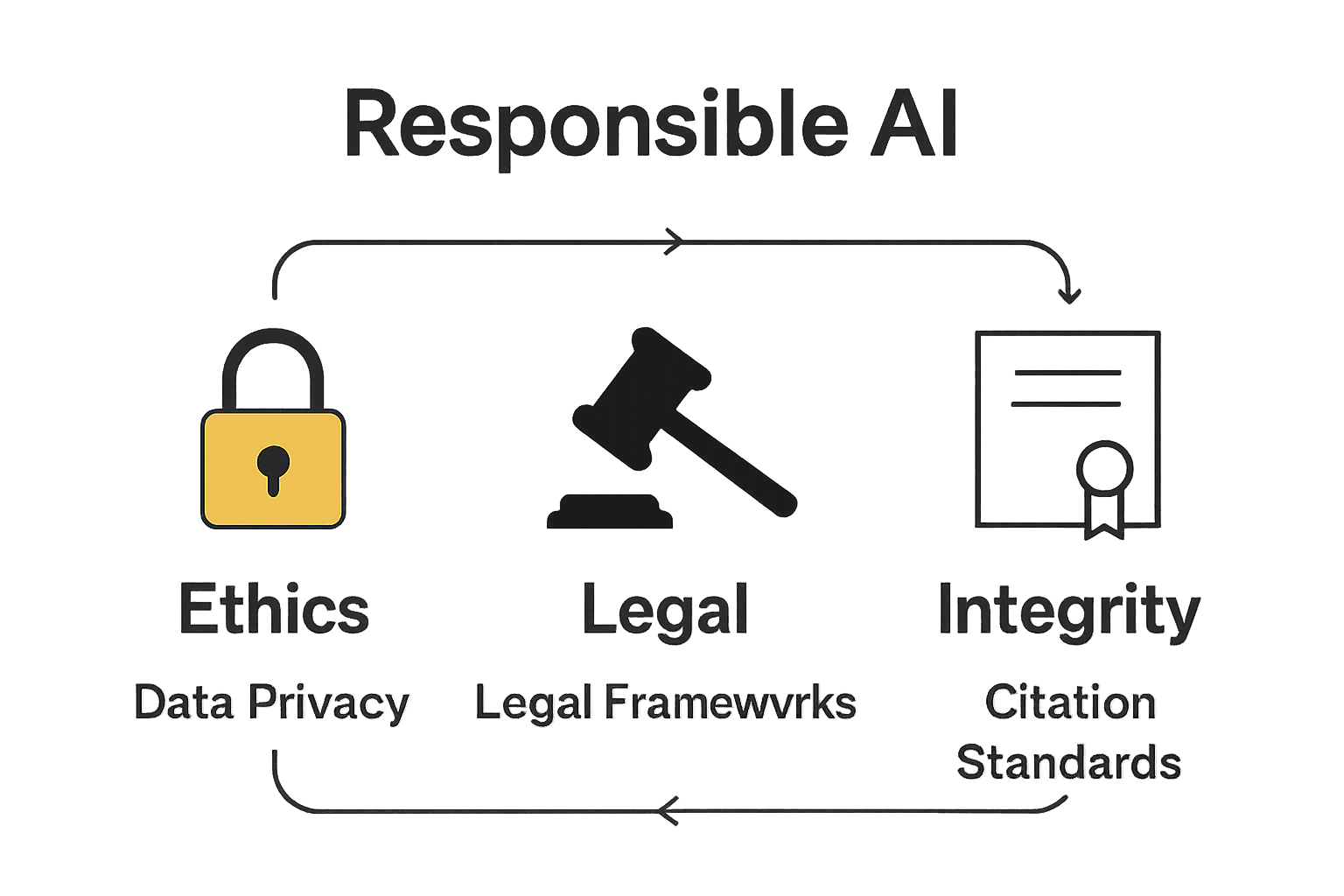Loading...

Over 90 percent of students encounter challenges when tasked with defining Artificial Intelligence for academic essays. As AI shapes more aspects of daily life and research, understanding its true meaning goes beyond simple definitions or buzzwords. Grasping this topic can unlock deeper insights and help students build stronger, more credible arguments that stand out in academic writing.
| Point | Details |
|---|---|
| AI Definition | AI involves machines simulating human intelligence processes, including learning and reasoning. |
| Types of AI | AI systems can be categorized into various agents, each with unique operational mechanisms, such as reflex and learning agents. |
| Real-World Applications | AI is transforming industries like finance and healthcare through tasks like fraud detection and diagnostic assistance. |
| Ethical Considerations | Ethical challenges in AI include data privacy, algorithmic bias, and the need for transparency and responsible innovation. |
In academic writing, Artificial Intelligence (AI) represents a complex technological domain that involves machines simulating human-like intelligence processes. According to GeeksforGeeks, AI can be defined as "the simulation of human intelligence processes by machines, especially computer systems," which fundamentally encompasses learning, reasoning, and self-correction capabilities.
The core of AI lies in developing computer systems that transcend traditional programming limitations. GeeksforGeeks elaborates that AI refers to systems capable of performing tasks traditionally requiring human intelligence, such as:
When crafting an academic essay about AI, students must understand that this technology is not a monolithic concept but a dynamic field with multiple interconnected dimensions. The definition extends beyond mere computational processes to encompass advanced algorithmic systems that can adapt, learn, and respond to complex scenarios. Understanding this nuanced perspective is crucial for producing a sophisticated academic analysis of artificial intelligence.
For students seeking additional guidance on structuring their AI essays, our academic writing guide offers comprehensive insights into developing compelling arguments and maintaining scholarly rigor.
Artificial Intelligence (AI) is a diverse field with multiple types and approaches that reflect its complexity and adaptability. GeeksforGeeks highlights that AI systems can be categorized into distinct agent types, each with unique operational mechanisms. These agent categories include:
The algorithmic landscape of AI is equally sophisticated. According to GeeksforGeeks, AI encompasses various algorithmic approaches that serve different computational purposes, such as:
Understanding these types and approaches is crucial for academic essays, as it demonstrates a nuanced comprehension of AI's technological complexity. By exploring these diverse methodologies, students can develop more sophisticated and insightful analyses.

For those seeking deeper insights into AI's intricate frameworks, our comprehensive AI guide provides an in-depth exploration of these technological paradigms and their evolving applications.
Artificial Intelligence represents a transformative technology with multifaceted capabilities that extend far beyond traditional computational approaches. AICompetence reveals that AI integrates multiple sophisticated subfields, creating a complex ecosystem of technological innovation that spans various critical domains.
The core features of AI encompass several groundbreaking capabilities:
In real-world applications, AI demonstrates remarkable versatility across multiple sectors. According to AICompetence, the technology has significant implementations in:
Students writing academic essays about AI should recognize that these applications are not isolated technological experiments but interconnected systems transforming how we solve complex global challenges. Understanding this holistic perspective is crucial for producing nuanced, insightful research.
For a deeper exploration of AI's practical applications, our comprehensive AI guide offers extensive insights into this rapidly evolving technological landscape.
Crafting a compelling academic essay on Artificial Intelligence requires a strategic and methodical approach. GeeksforGeeks suggests that an effective AI essay should follow a structured framework that comprehensively explores the subject's intricate dimensions.
The recommended essay structure typically includes the following key components:
According to GeeksforGeeks, a well-constructed AI essay should meticulously cover:
Research and citation are paramount in academic AI essays. Students should leverage peer-reviewed journals, academic publications, and reputable technological sources to substantiate their arguments. Critical thinking and an objective analysis of AI's multifaceted nature will distinguish an outstanding essay from a merely competent one.
For students seeking additional guidance on crafting impeccable academic essays, our standard essay format guide provides comprehensive insights into creating structured, compelling academic writing.
Artificial Intelligence presents a complex landscape of ethical, legal, and academic challenges that demand careful scholarly consideration. R5 highlights the critical concerns surrounding AI's integration, emphasizing the need for comprehensive examination of its technological and societal implications.
Key ethical considerations in AI research and writing include:
According to AICompetence, the advancing AI technologies raise crucial questions about accountability and broader societal impacts. Students must critically address:
Academic integrity becomes paramount when writing about AI. Students must maintain rigorous standards of research, citing sources accurately, and presenting balanced perspectives. This requires a nuanced understanding of both the technological capabilities and the potential ethical challenges inherent in AI development.

To navigate the complex terrain of academic writing about AI, students can benefit from our guide on understanding academic dishonesty, which provides crucial insights into maintaining scholarly excellence.
Writing an academic essay on Artificial Intelligence involves navigating complex definitions, exploring various AI types, and addressing critical ethical considerations. Many students struggle to structure their essays, ensure academic integrity, and present in-depth analysis that reflects the dynamic nature of AI technology. If you find yourself overwhelmed by incorporating concepts like machine learning algorithms, AI agent types, or ethical challenges into a compelling narrative, you are not alone.

Unlock your full potential with Samwell.ai, the advanced AI-driven platform designed to support your academic writing journey. Whether you need help generating structured outlines with Guided Essays or refining your work for originality and citation compliance using the powerful 'Power Editor', Samwell.ai empowers you to craft insightful, well-researched essays. Start transforming your AI essay today and ensure your work stands out with credible content and scholarly rigor.
Artificial Intelligence (AI) is defined as the simulation of human intelligence processes by machines, particularly computer systems, encompassing learning, reasoning, and self-correction capabilities.
The major types of AI systems include Simple Reflex Agents, Model-Based Reflex Agents, Goal-Based Agents, Utility-Based Agents, and Learning Agents. Additionally, AI approaches consist of various algorithmic methods such as search algorithms, supervised learning, and dynamic programming.
AI is applied in various sectors including finance for fraud detection, automotive for autonomous driving systems, healthcare for diagnostic assistance, and education for adaptive learning platforms, showcasing its versatile impact on society.
An effective AI essay should include an introduction with a clear definition and thesis statement, core content sections detailing the history, types, applications, and ethical considerations of AI, and a conclusion summarizing key points and implications.



